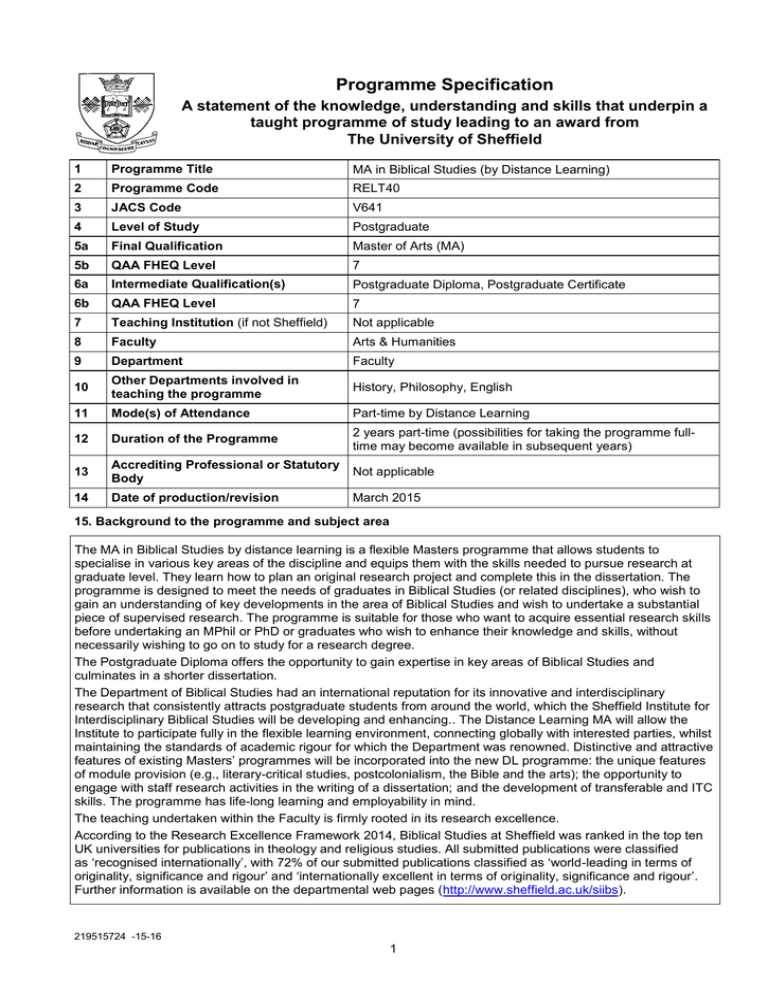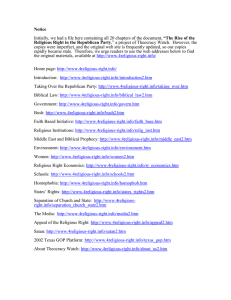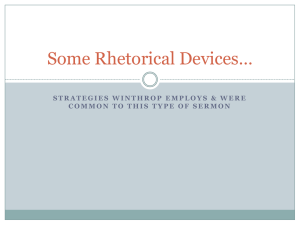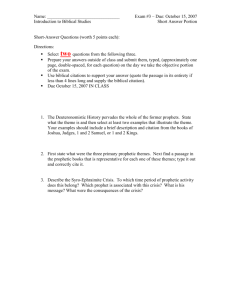Document 16116160
advertisement

Programme Specification A statement of the knowledge, understanding and skills that underpin a taught programme of study leading to an award from The University of Sheffield 1 Programme Title MA in Biblical Studies (by Distance Learning) 2 Programme Code RELT40 3 JACS Code V641 4 Level of Study Postgraduate 5a Final Qualification Master of Arts (MA) 5b QAA FHEQ Level 7 6a Intermediate Qualification(s) Postgraduate Diploma, Postgraduate Certificate 6b QAA FHEQ Level 7 7 Teaching Institution (if not Sheffield) Not applicable 8 Faculty Arts & Humanities 9 Department Faculty 10 Other Departments involved in teaching the programme History, Philosophy, English 11 Mode(s) of Attendance Part-time by Distance Learning 12 Duration of the Programme 2 years part-time (possibilities for taking the programme fulltime may become available in subsequent years) 13 Accrediting Professional or Statutory Body Not applicable 14 Date of production/revision March 2015 15. Background to the programme and subject area The MA in Biblical Studies by distance learning is a flexible Masters programme that allows students to specialise in various key areas of the discipline and equips them with the skills needed to pursue research at graduate level. They learn how to plan an original research project and complete this in the dissertation. The programme is designed to meet the needs of graduates in Biblical Studies (or related disciplines), who wish to gain an understanding of key developments in the area of Biblical Studies and wish to undertake a substantial piece of supervised research. The programme is suitable for those who want to acquire essential research skills before undertaking an MPhil or PhD or graduates who wish to enhance their knowledge and skills, without necessarily wishing to go on to study for a research degree. The Postgraduate Diploma offers the opportunity to gain expertise in key areas of Biblical Studies and culminates in a shorter dissertation. The Department of Biblical Studies had an international reputation for its innovative and interdisciplinary research that consistently attracts postgraduate students from around the world, which the Sheffield Institute for Interdisciplinary Biblical Studies will be developing and enhancing.. The Distance Learning MA will allow the Institute to participate fully in the flexible learning environment, connecting globally with interested parties, whilst maintaining the standards of academic rigour for which the Department was renowned. Distinctive and attractive features of existing Masters’ programmes will be incorporated into the new DL programme: the unique features of module provision (e.g., literary-critical studies, postcolonialism, the Bible and the arts); the opportunity to engage with staff research activities in the writing of a dissertation; and the development of transferable and ITC skills. The programme has life-long learning and employability in mind. The teaching undertaken within the Faculty is firmly rooted in its research excellence. According to the Research Excellence Framework 2014, Biblical Studies at Sheffield was ranked in the top ten UK universities for publications in theology and religious studies. All submitted publications were classified as ‘recognised internationally’, with 72% of our submitted publications classified as ‘world-leading in terms of originality, significance and rigour’ and ‘internationally excellent in terms of originality, significance and rigour’. Further information is available on the departmental web pages (http://www.sheffield.ac.uk/siibs). 219515724 -15-16 1 16. Programme aims The programme aims to provide students with an in-depth understanding of some of the key issues within contemporary scholarly research in biblical studies, together with the context and process of independent research in the discipline. It also aims to equip students with the skills required for further academic research or careers related to biblical studies. Specifically, it aims to: A1 Develop an understanding of key areas of biblical studies, current in the academic field (such as literary studies, the reception history of the Bible, recent developments in postcolonial theory and the interaction of the Bible and the arts) A2 Familiarise students with essential primary and secondary source materials, in order to critically reflect upon, and engage with, some of the major current issues within Biblical Studies A3 Develop an understanding of various models of biblical interpretation and hermeneutical reflection (e.g., use of the social sciences, modern philosophical approaches, literary theory etc.) A4 Develop an ability to critically assess such models and to understand the need for analytical rigour A5. Develop skills in acquiring, using, and critically evaluating, information and published research (particularly that freely available on the web) A6 Develop independent research skills and an understanding of the application of such skills to biblical studies A7. Equip students with the ability to identify problems and ways of resolving them, to construct and sustain logical arguments, and to present reasoned and informed arguments clearly in both oral and written form A8. Develop abilities in a broad range of other transferable skills, such as information gathering and IT A9. Provide focussed training and preparation for subsequent research A10. Develop computer and IT skills relevant for the handling of textual (and possibly graphical information), including the use of the internet and a variety of appropriate computer software. 17. Programme learning outcomes Knowledge and understanding. Students will have developed: K1 A detailed awareness of key issues in contemporary Biblical Studies (e.g., literary studies, postcolonialism, reception history, modern philosophical engagement with the Bible, the interaction of the Bible and the arts). K2 The skills necessary to engage with, critically assess, and apply, a range of primary & secondary sources to their research. K3 A range of interpretative, critical, and analytical skills drawing upon contemporary issues in the discipline (e.g. literary theory, reception history, postcolonial theory). K4 An understanding of the main approaches to biblical exegesis and hermeneutics and a critical assessment of these (e.g., the use of the social sciences, philosophical approaches, literary theory). K5 A range of independent research skills and an understanding of the application of such skills to biblical studies. This will culminate in the dissertation, a detailed piece of independent research, which will provide focussed training and preparation for subsequent research. K6 An ability to identify problems and ways of resolving them, to construct and sustain logical arguments, and to present reasoned and informed arguments clearly in both oral and written form. K7 An ability in a broad range of other transferable skills, such as information gathering and IT. Skills and other attributes. Students will have developed: S1 An ability to assess and deploy a range of interpretative skills (including methodological, historical, and textual), to specific areas of biblical studies. S2 An ability to summarize and describe information from primary and secondary sources, to critically assess this knowledge and relate it to specific aspects of biblical studies. S3 An ability to critically assess scholarly arguments and be able to offer informed and reasoned arguments of their own. 219515724 -15-16 2 S4 An ability to communicate ideas and arguments through the development of oral and written skills. S5 A range of intellectual and transferable skills and a subject knowledge required for further study or entry into the workforce, as appropriate. Candidates for the MA: S6 Will have acquired key skills in the development of a proposal for research and the design, development, and implementation of a major research project. Candidates for the Postgraduate Diploma: S6 Will have acquired key skills in the development of a proposal for research and the design, development, and implementation of a 6,000 word research project. 18. Teaching, learning and assessment Development of the learning outcomes is promoted through the following teaching and learning methods: Teaching materials will be available on a dedicated Virtual Learning Environment (VLE). Interactive relations between lecturers and students will be established via an appropriate blend of chat-rooms, discussion boards, email, telephone, and (if suitable), video-calls. The teaching and learning materials will provide opportunities for discussion, analysis, understanding and response, and are designed to help foster problem solving, communication and presentation skills. The modules within the programme will help to develop essential techniques for research in Biblical Studies, including how to define a research topic, the location and effective use of research resources, the internet and research, analytical and critical skills, and the writing up of research (with help in refining the presentation of submitted work). These will contribute to the achievement of knowledge and understanding (K1-7) and the development of key skills (S1-6). Independent Study. The programme places considerable emphasis on the need to implement a philosophy of student-centred learning in order to help students develop an independent and self-motivated approach to their learning. The dissertation helps to refine research skills and promote independent study. Independent learning contributes to the achievement of knowledge and understanding (K1-7) and the refinement of key skills (S1-6). Opportunities to demonstrate achievement of the learning outcomes are provided through the following assessment methods: The programme uses a wide variety of assessment (such as essays, thesis proposal, analytical bibliography, exegesis, and a self-reflective paper), to test the ability to demonstrate subject knowledge (K1-4) and the development and refinement of key skills (S1-5). The dissertation allows the demonstration of detailed subject knowledge, independent learning, and the application of key skills (K5-7, S1-4, 6). Essays are used to evaluate the student’s comprehension of key skills in biblical studies and to develop the student’s ability to communicate clearly through fluent writing and the construction of well-developed arguments (K1-7, S1-4). The dissertation is the culmination of the programme and allows the expression of core and particularly specialist knowledge to be demonstrated, as well as development of the ability to plan and conduct research. It also allows other forms of knowledge and skills to be demonstrated (K5-7, S6). Whilst written assessments are used to develop all key areas of understanding and skills, there is an expectation that students will also develop and demonstrate skills and understanding outside of formal assessment mechanisms, such as skills in time management, self-motivation and self-development. 219515724 -15-16 3 19. Reference points The learning outcomes have been developed to reflect the following points of reference: The research interests of departmental staff and the research strategy of the Department; Subject Benchmark Statements http://www.qaa.ac.uk/AssuringStandardsAndQuality/subject-guidance/Pages/Subject-benchmarkstatements.aspx Framework for Higher Education Qualifications (2008) http://www.qaa.ac.uk/Publications/InformationAndGuidance/Pages/The-framework-for-higher-educationqualifications-in-England-Wales-and-Northern-Ireland.aspx University Strategic Plan http://www.sheffield.ac.uk/strategicplan Learning and Teaching Strategy (2011-16) http://www.shef.ac.uk/lets/strategy/lts11_16 The Collaborative provision and flexible and distributed learning (including e-learning) (Sept 2004). The external examiner has been consulted and has made positive comments regarding the programme. 20. Programme structure and regulations The programme is modular in format, allowing students to engage with a number of key areas of Biblical Studies plus, in the dissertation, to specialise in a topic of their choice. It is taken over twenty-four months (part-time). Students will accumulate a total of 180 credits by taking three taught modules (30 credits each) plus a dissertation of 90 credits. The three taught modules are taken over three semesters, and the dissertation over the final semester plus the summer vacation (completed by Aug 31st). SIIBS has a clear rationale for employing this framework as it allows the programme to be completed within two years of study with students working on no more than one module per semester. It also has the clear advantage of remaining within the semester framework currently used within the faculty. This will allow the dovetailing of key resources (e.g., e-Offprints, ebooks etc), between an existing undergraduate or an MA course with a corresponding DL course. SIIBS believes that this will be a fruitful strategy and will appeal to many and varied learning partners such as church ministers, interested parties in part-time work etc., and will be particularly relevant to on-going developments between the Department and the College of the Resurrection (Mirfield) & the Yorkshire Ministry Course. The Postgraduate Diploma is awarded for the successful completion of the three modules plus a 30 credit dissertation. Detailed information about the structure of programmes, regulations concerning assessment and progression and descriptions of individual modules are published in the University Calendar available on-line at http://www.shef.ac.uk/govern/calendar/regs.html. 21. Student development over the course of study The programme is designed to introduce key skills throughout the three taught modules and to culminate in the writing of the dissertation which will provide a basis for development and consolidation of knowledge and understanding of those key skills. The taught modules will provide the foundation to key critical thinkers and methods of analysis. Teaching is informed by the latest research in biblical studies. Students will have further refined their analytical, critical, and problem-solving skills and will be able to handle complex materials in a confident and creative manner. Their work will be distinguished by originality and a critical understanding of the latest development in research. 219515724 -15-16 4 22. Criteria for admission to the programme Detailed information regarding admission to programmes is available from the University’s On-Line Prospectus at http://www.shef.ac.uk/courses/. Applicants must have a good first degree (2.1 Honours degree (or overseas equivalent)) in Biblical Studies or a cognate subject, together with a minimum of 6.5 on IELTS; 600 on TOEFL; 250, CBT. 23. Additional information Enquiries should be made in the first instance to the Administrator for Interdisciplinary Biblical Studies at siibs@shef.ac.uk (tel. 0114 222 0507). This specification represents a concise statement about the main features of the programme and should be considered alongside other sources of information provided by the teaching department(s) and the University. In addition to programme specific information, further information about studying at The University of Sheffield can be accessed via our Student Services web site at http://www.shef.ac.uk/ssid. 219515724 -15-16 5





